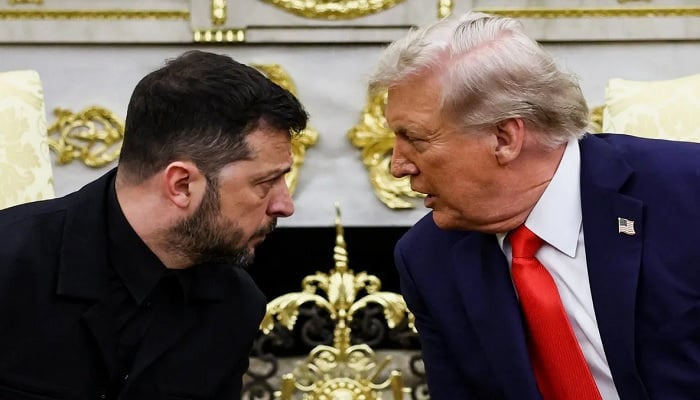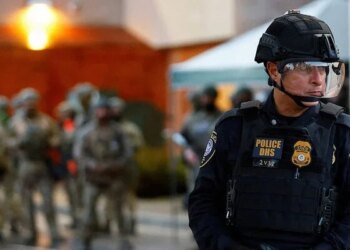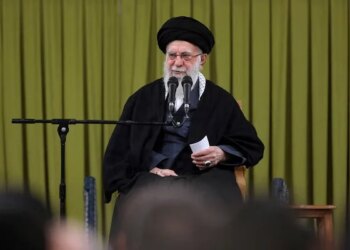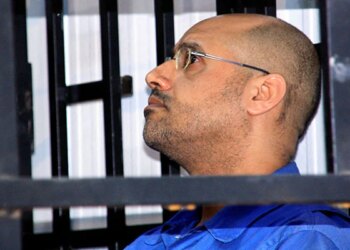Select Language:
- Russia conducts its largest attack this month amidst ongoing peace efforts.
- Uncertainty remains over U.S. security guarantees for Ukraine.
- Potential locations are being considered for a tripartite summit.
U.S. President Donald Trump announced on Tuesday that U.S. troops won’t be deployed to Ukraine but indicated that air support might be an option to help end Russia’s conflict there. The day after promising security assurances at an extraordinary White House meeting, the prospects for peace are still unclear as the U.S. and allies discuss what military assistance for Ukraine could involve.
“Europe is willing to send troops on the ground for security, and we’re prepared to assist them, primarily with air support,” Trump said during an interview on Fox News’ “Fox & Friends.” He did not specify further.
Following Monday’s discussions, Russia launched its most intensive air assault on Ukraine in over a month. Trump acknowledged that Vladimir Putin might be less inclined to pursue a deal now, saying, “We’ll see what President Putin does in the coming weeks.”
The exact nature of U.S. military aid—such as missile defense systems or fighter jets enforcing a no-fly zone—remains unspecified. White House Press Secretary Karoline Leavitt confirmed that U.S. air support is a possible option but did not provide specifics.
“While the President has been clear that American troops will not be on the ground in Ukraine, we are ready to coordinate and possibly offer other security guarantees to our European allies,” she stated during a briefing.
Experts estimate over a million people have been killed or injured since Russia’s full-scale invasion began in February 2022.
Ukrainian President Volodymyr Zelenskyy described recent White House talks as a “significant step forward” toward ending Europe’s deadliest conflict in 80 years. Zelenskyy also mentioned plans for a trilateral summit involving himself, Putin, and Trump, contrasting the positive tone of recent talks with their earlier, more strained, encounter in February.
There’s discussion about hosting the summit in Budapest, with a White House official mentioning talks with Hungarian Prime Minister Viktor Orban. Istanbul and Switzerland are also considered potential venues; Hungary is particularly notable due to Orban’s close ties with Putin and the fact that Putin can visit without fear of arrest on International Criminal Court charges. Ukraine’s stance on Hungary as a host remains uncertain.
Meanwhile, Russia launched an overnight attack on Ukraine using 270 drones and 10 missiles, damaging energy infrastructure and causing fires in the Poltava region, which hosts Ukraine’s only oil refinery. Despite the aggression, Russia returned 1,000 bodies of Ukrainian soldiers, while Ukraine handed over 19 Russian bodies, according to officials and state media.
Ukraine’s allies convened to discuss further sanctions to increase pressure on Russia, with plans for U.S. and European security teams to collaborate in the coming days. NATO military leaders are also set to meet on Wednesday, with U.S. Joint Chiefs Chairman Gen. Dan Caine expected to join remotely.
Although Trump claimed on Monday that Putin sought a bilateral meeting with Zelenskyy, Moscow has not made any firm promises. Russian Foreign Minister Sergei Lavrov indicated that Russia is open to various formats for negotiations but stressed that any leaders’ summit should be carefully prepared.
Putin has emphasized that Russia will not accept NATO troops in Ukraine and has not backed down from territorial demands, including land outside Moscow’s control, following his recent summit with Trump in Alaska.
Analysts suggest Russia might prolong the war while attempting to counteract U.S. diplomatic pressure through extended negotiations. Both Ukraine and European allies seem to be avoiding openly challenging Trump’s conflicting signals to prevent jeopardizing peace prospects, with some describing the U.S. approach as cautiously “tiptoeing around Trump.” Many believe Trump’s vague statements about security guarantees make it difficult to gauge his true intentions.







